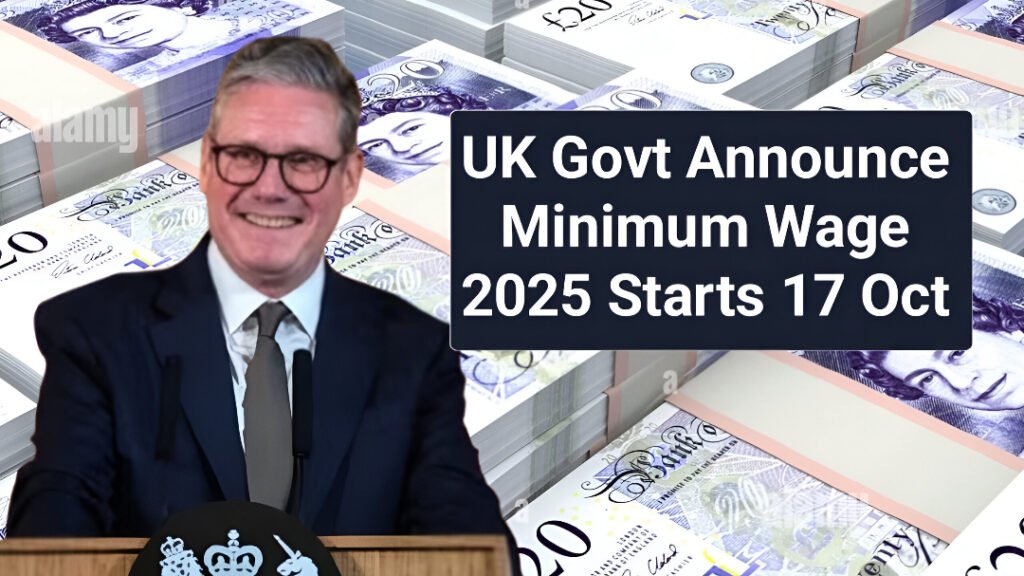Hello Everyone, The UK Government has officially announced a significant increase in the National Minimum Wage, effective from 17 October 2025. This new pay adjustment comes as part of ongoing efforts to support workers across various industries, ensuring fair compensation and promoting economic stability. The rise in minimum wage is expected to impact millions of employees across the United Kingdom, from retail staff to hospitality workers, and will provide much-needed relief against rising living costs.
With this adjustment, the government aims to strengthen the financial security of low-paid workers while encouraging employment opportunities in key sectors. Employees should now review their contracts and ensure that their employers comply with the new wage standards.
New Hourly Rates
Starting 17 October 2025, the following minimum wage rates will apply across different age groups and categories of workers in the UK:
-
Workers aged 23 and over (National Living Wage) – £12.00 per hour
-
Workers aged 21–22 – £10.50 per hour
-
Workers aged 18–20 – £8.50 per hour
-
Workers under 18 – £6.50 per hour
-
Apprentices – £7.00 per hour
These new rates represent an increase ranging between 10% and 12% compared to the previous year, marking a substantial effort by the government to keep pace with inflation and rising living expenses.
Who Benefits?
The minimum wage increase will benefit several groups of workers, particularly those in sectors that traditionally offer lower wages.
-
Retail and Hospitality Workers: Employees in shops, restaurants, and hotels will directly feel the impact of higher hourly pay.
-
Apprentices and Young Workers: The government has emphasised support for young workers and apprentices, ensuring they earn a fair wage while gaining essential skills.
The policy ensures that no worker in the UK is paid below a certain minimum threshold, helping to reduce income inequality and improve living standards across the country.
Economic Impact
Increasing the minimum wage has wide-ranging implications for the UK economy. Experts suggest that higher wages may boost consumer spending, as workers have more disposable income. This, in turn, could help small businesses recover and grow. Key Economic Impacts Include.
-
Increased Consumer Spending: Workers with higher wages are likely to spend more, stimulating demand for goods and services.
-
Reduced Poverty Levels: Raising the minimum wage helps lift low-income families out of poverty, improving overall social wellbeing.
-
Business Adjustments: Some businesses may need to adjust their budgets or staffing plans to accommodate the new wage structure.
While the changes are largely positive, some economists caution that higher wages could also lead to increased operational costs for certain sectors, particularly small businesses. However, the government believes that the long-term benefits outweigh potential short-term challenges.
Employer Responsibilities
With the new wage increase, employers in the UK must comply with updated regulations. Failure to pay employees the correct rate can lead to penalties and legal action. Employers are advised to.
-
Update Payroll Systems: Ensure that all staff receive the correct new minimum wage starting from 17 October 2025.
-
Inform Employees: Communicate clearly about changes in pay rates and adjustments to working contracts if necessary.
-
Monitor Compliance: Regularly review wage policies to avoid underpayment or legal issues.
The government has stated that inspections will continue to ensure compliance, and workers are encouraged to report any discrepancies in their wages.
Regional Considerations
While the minimum wage rates apply UK-wide, there are regional variations in cost of living that might affect how these changes are experienced.
-
London and South East England: Due to higher living costs, employees may still feel financial pressure despite wage increases.
-
Other Regions: In regions with lower living expenses, the increase may provide more significant improvements in quality of life.
The UK Government has designed the new wage policy to provide a balanced approach, ensuring fairness across regions while recognising the unique economic needs of different areas.
Tips for Employees
Employees should take certain steps to ensure they fully benefit from the wage increase:
-
Check Payslips: Confirm that the new hourly rate is reflected in your pay from 17 October 2025.
-
Understand Your Rights: Familiarise yourself with the UK National Minimum Wage regulations.
-
Negotiate Benefits: Higher wages may open discussions about bonuses, overtime, or flexible working arrangements.
These proactive steps will help workers take full advantage of the new policy and ensure they are fairly compensated.
Conclusion
The UK Government’s announcement of the minimum wage increase from 17 October 2025 marks a significant step towards financial fairness and worker protection. With higher pay rates across all age groups and categories, millions of employees will benefit from improved earning potential. While businesses may face some adjustments, the overall impact on the economy, poverty reduction, and social wellbeing is expected to be highly positive. For employees, staying informed and vigilant about wage changes is essential to ensure they receive the benefits they are entitled to.
The minimum wage increase demonstrates the UK Government’s commitment to protecting workers’ rights while fostering a stronger, fairer economy for all.
